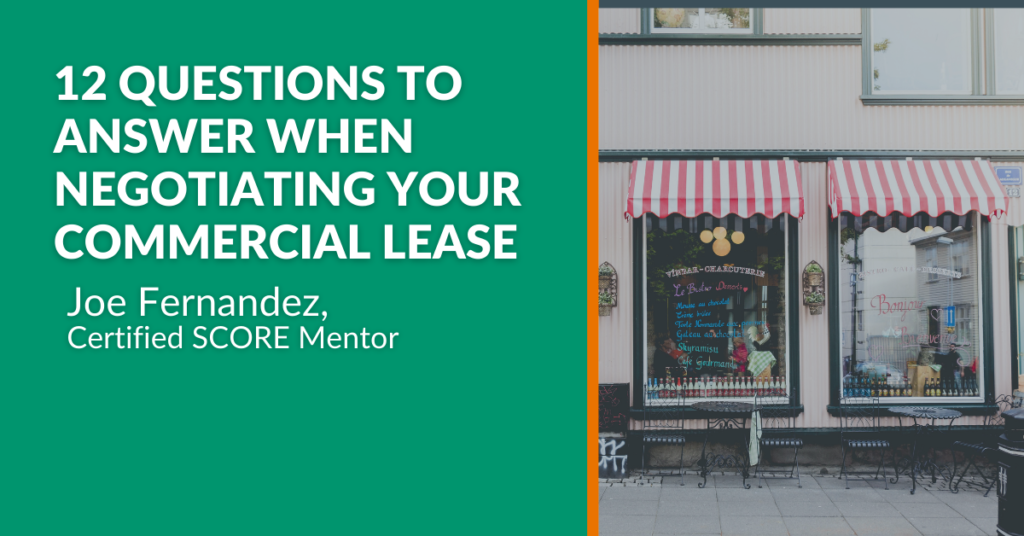
You’ve searched hard for the perfect brick-and-mortar location for your business, and you think you found it. But don’t start planning your Grand Opening yet. You first have to secure that space, so you need to negotiate and sign a lease.
Retail and commercial leases are complex legal contracts. Many details will affect how much freedom you will have and how much money you will spend over the term of that lease. However, with some planning, knowledge, and help, you can negotiate terms that will support, not hinder, the pursuit of your dream.
Whether you're renting space for a retail shop, an office, or a production facility, answer the following questions as you review your proposed lease:
- What are your total monthly costs?
What is the most you can afford to pay in one month? Your occupancy costs will be one of your most significant business expenses, so don’t go over your budget. Do not accept the landlord’s initial rent proposals. Instead, counter the proposed rent amount and go up from there. Your base rent may not be your only monthly charge. You probably will have to pay for Common Area Maintenance (CAM). CAM covers maintaining and cleaning the common areas of your center, like the parking lot, walkways, elevators, and lobbies. You may also have to pay your share of the property taxes and insurance. Some landlords also add an advertising fee. Define all these charges in your lease and insist on the right to audit them. Also, try to negotiate a cap on these charges. In addition, don’t forget that the landlord will require a security deposit.
- Will you need to provide a Personal Guarantee?
If you have a relatively new business, it probably has not established its credit yet. Therefore, even if you rent as a corporation, the landlord will want you to guarantee the lease. In effect, you will cosign the lease, making you personally responsible for all payments. If the business fails, you will be obligated personally to pay all monies due for the remainder of the lease term. You will need a good personal credit score for the landlord to accept your guarantee and risk leasing to you.
- What is the lease term?
Landlords like long lease terms. Tenants prefer shorter leases if things don’t work out and they need to exit. On the other hand, a longer lease does offer a tenant more security should the business be successful. One way to achieve both goals is to have a shorter initial term than the landlord wants and one or more options for renewal. If the landlord wants a five-year term, for example, maybe you take an initial two-year term with a three-year option for renewal. Be sure to negotiate the rent for all options at the outset and include that in the lease. Don’t leave the rent for the options “To Be Determined.”
- What if you need to terminate the lease before it expires?
What happens if the landlord fails to deliver on their obligations? What if you need to close permanently because of poor business or a fire in your space? What happens if you need more space before your lease expires? What if the landlord wants to make changes to the shopping center or building that affect your business negatively, like reducing parking? Spell out the circumstances under which you or the landlord can terminate the lease and the consequences of such early termination. Also, spell out the conditions under which you can sublease your space to another party.
- Do you have an opportunity to cure defaults?
If you are late with your rent or breach the lease in any way, you want the landlord to notify you of that breach and offer you time to “cure” it. A landlord should agree to a 30-day “cure period” during which you can fix any problems before the landlord can take action against you. If a landlord does not give you a cure period, walk away! Similarly, you should negotiate a “grace period” before your rent payment is late. For example, if your rent is due on the first of the month, negotiate a length of time after the due date during which you can make your payment without incurring fees or penalties. Five days should be the minimum.
- Is your space ready for your use?
Be sure that your space meets current codes, including ADA standards, or that the landlord pays to make the space comply. Most spaces typically have finished walls around the perimeter, minimal lighting and electrical service, simple floor covering, and one bathroom. Usually, that will not meet your business needs without further improvement. How much will those improvements cost? How long will they take to complete? Who will pay for them? Have your construction and fixturing plans ready before you begin lease negotiations so you can address these questions. Also, negotiate a Tenant Improvement (“TI”) Allowance from the landlord. This allowance is the amount they will pay you to cover some or all of your construction costs. Be careful if the landlord insists that you use their contractors for your work; you should hire contractors you know and trust. The landlord will want you to open for business as soon as possible from the date you sign your lease. Negotiate enough time to acquire construction permits and complete your build-out, say 90 or 120 days. This build-out period should be rent-free.
- Who is responsible for the HVAC and other mechanical systems?
Many landlords require their tenants to be responsible for the Heating, Ventilation, and Air Conditioning (HVAC) system for their space. The tenant pays for quarterly maintenance, repairs, and replacement if needed. These costs can add up to many thousands of dollars. Be sure to inspect the HVAC, plumbing, and electrical systems thoroughly. This way, you know what you are inheriting and can assess the risk. Try to negotiate these terms out of your lease. If not, see if you can share the costs with the landlord or if the landlord is willing to cap your expenses.
- Do you need a co-tenancy clause?
Large or well-known tenants like Publix or Target attract traffic to a shopping center. Did you choose your location because of such anchor tenants? What happens if they close and leave? The customers they attract will disappear, which likely will hurt your business. In addition, if several other tenants close and their former spaces stay empty, the center will look rundown and uninviting. You may want to break your lease if any of these events happen.
- Can you have an exclusivity clause?
With an exclusivity clause in your lease, your landlord may not rent to a business like yours. This clause helps protect your investment. The flip side is that the landlord may already have such clauses with other tenants. Exclusivity clauses could stop you from offering some of the products or services you contemplate or even prevent you from renting in the center at all. Be sure you know all restrictions on your use of the property. For example, if you open a hair salon, can you offer manicures if a nail bar is already in the center? If you open a coffee shop, can you sell sandwiches if there is a restaurant there?
- Are there any restrictions on your operation or marketing?
Some landlords dictate what hours you must be open for business. Be sure you can operate during the days and hours you want to. Some landlords restrict your ability to market in the center. Can you place promotional materials on your store windows, or must the windows remain clear? Are signs, displays, and sales allowed on the sidewalk in front of your store? Can you hang banners from the building? Also, verify that your business complies with any zoning regulations covering the property and your space.
- How should I approach the negotiations?
Negotiate everything. Are there other extras the landlord can offer you? For example, can they offer one or two (or more) months rent-free as an incentive if their rent number is firm? Can they put your business name and logo on the shopping center signs at no cost to you? Which conditions are deal-breakers for you? Which terms are negotiable? What is your bottom line for each of them? Be willing to walk away if the lease terms are too risky for you. Think about negotiating with two or three locations at the same time. You will feel better about walking away from one site if you have other options.
- Who can help me?
Consider using a real estate agent specializing in commercial and retail leasing to represent you; this is not the leasing agent who represents the landlord. Your “tenant rep” can help you find a good location and assist you in negotiating your lease. Remember that your lease is a legal contract, so retain an attorney. Your attorney will identify landmines and opportunities in any proposed lease and help you figure out how to address them. You may even want to consider having the attorney negotiate the lease for you. Use the resources available to you from The Greenhouse and SCORE, including webinars and one-on-one mentoring. Don’t go at this by yourself.
ABOUT THE AUTHOR

Joe Fernandez, Certified SCORE Mentor
Joe Fernandez’s passion is to teach small business owners how to start, manage, and grow their companies. He pursues that mission as a certified mentor and workshop presenter for SCORE, where he has guided hundreds of entrepreneurs since 2018. Joe has steered several public and private retail companies to success. As CEO, board director, and owner, he has been involved in every aspect of their management, including leasing numerous retail locations. Joe has degrees from MIT and the University of Chicago. He is a consultant and a private investor in the Tampa Bay area and presents webinars for The Greenhouse.
